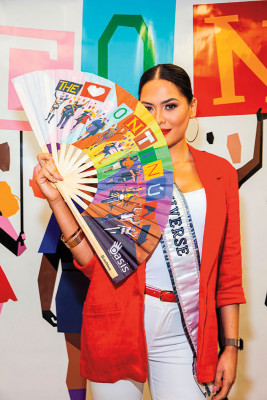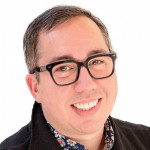On May 16, 2021, Miss Mexico Andrea Meza, age 26, was crowned Miss Universe 2020 at the 69th annual competition in Hollywood, Florida. (The event had been postponed due to the COVID-19 pandemic.) Undeniably beautiful, the raven-haired Chihuahua City native is much more than a smart sash and a fabulous crown.
A women’s rights activist, Meza has a degree in software engineering and is a certified makeup artist and model. She’s passionate about fitness and health, consumes a vegan diet (her favorite dish is vegan ceviche made with cauliflower and texturized soy) and enjoys extreme sports in her spare time.
The Miss Universe Organization spared no time in getting its glamorous representative to work. Barely a month after the pageant, Meza was touring New York City in stilettos in partnership with the Latino Commission on AIDS. She made several stops, including the LGBTQ rights landmark The Stonewall Inn, the HIV service center GMHC and God’s Love We Deliver, a nonprofit that delivers meals to people too sick to cook for themselves.
Her mission was to spread awareness about HIV, including testing, and to promote sexual health overall. She even got an HIV test herself while at the GMHC Testing Center. POZ caught up with the charming Meza at the Oasis Latino L.G.B.T.S. Wellness Center in midtown Manhattan.
It’s so nice to meet you! What’s one of the most exciting and fun things that has happened since you were crowned?
Everything is new for me. Everything is exciting. I’ve been enjoying every single part of the journey. I think one of the most exciting things has been to get to know all the different people pursuing different objectives, like the Latino Commission on AIDS.
One of the best experiences I’ve had was with God’s Love We Deliver, where I was able to prepare and pack food for people living with chronic illnesses. That was awesome because you get to see that the small work you do, combined with the work others are doing, is for a greater purpose.
You see all these people going in and out of the building delivering food, and you feel that you’re part of this big thing. And you feel that your small contribution is helping someone.
How did you get involved with the Latino Commission on AIDS?
Now that I’m Miss Universe, I have these great opportunities to work with different organizations and associations. [The Miss Universe Organization] has been working with GMHC and the Latino Commission on AIDS for years and years. So I’m honored that I get to have this opportunity.

Miss Universo 2020 Andrea MezaCortesía de La Comisión Latina sobre el SIDA
The Miss Universe Organization is very steadfast in its work to spread awareness about HIV. Where else are you visiting to get the word out?
Before this meeting, I went to GMHC, and it was a great experience. All these people are working toward getting a healthier society and creating more awareness about HIV. I have to tell you, I come from a very Catholic country, and sometimes it is hard to talk about sex. It’s like a taboo. And when you don’t talk about these kinds of topics, then you are not really informed about them.
For me, it’s great that I am surrounded by a Latin community that is not afraid to talk about [sex and HIV] and is encouraging people to know more, to be more informed and educated and to keep spreading the word.
At GMHC, they gave you an HIV test. How was that experience for you?
It was actually pretty comfortable and a great experience. It was superfast also. I think there’s a lot of misinformation about testing. People don’t really know how it works, and they’re afraid to get tested. It was great. I mean, they ask you some personal questions, but everything is confidential, so I was perfectly fine with that. And in 20 minutes, I was out of there!
Why is it important for Latinos to care about HIV and get tested?
It’s important because we have to take care of ourselves, and we have to know where we stand. Sometimes we don’t get tested because we are afraid of the results, but if we know if we are positive or negative, we can take action. That’s why I’m doing this. That’s why I want to encourage people to do it, to forget about the taboos and forget about all the stigma. The people who work in HIV and AIDS are doing it because they are passionate about it. They’re not going to think something negatively about you. They just want you to be healthy.
I want to encourage people to get tested for HIV. I know it can be scary because there is a lot of stigma and a lot of misinformation, but it is easy, it is fast and it’s confidential, and that’s the most important aspect of it, because I know people might feel embarrassed to share their personal life. It is not like that. [The people who perform the testing] are going to treat you in an incredible way—they are not going to judge you—and it’s for your own good.
Besides HIV, I know that you also help spotlight other social issues, specifically violence against women. Tell me about your work with the Municipal Institute for Women in Mexico.
I started working with them a year ago. I became interested in gender-based violence because that is something that is very sad in my country. It is not only happening in Mexico and not only in Latin America, but it happens worldwide. When I realized that for so many years, I’ve been blind and I didn’t see it as a problem, I wanted to do something about it.
The first campaign I did with [the Municipal Institute for Women] was about street harassment. That’s one of the kinds of violence that we have normalized and don’t pay attention to. But when you are a woman outside, at least in Mexico, you feel you are in danger. You feel the need to text your mom or someone to tell them that you’re going out and you send your live location because you don’t know if you’re going to be able to get back home.
We started this campaign where we put up all these signs on the streets to encourage people to stop street harassment. Not only that, but we’re also working with the government to punish the people who are being violent in the streets. If you are catcalling a woman on the street, you are going to be punished. They’re not going to go easy on you. So that is one way we can start creating awareness and change.
How does this work and your HIV activism overlap with your own thoughts and feelings about health and fitness?
For me, it’s crucial to maintain a safe and healthy lifestyle. We only have one body in this life, and we only have this one life. If we don’t take care of it, we’re going to regret it at some point.
That’s why I love working out, why I like to have healthy eating habits. That’s why it’s important to go to the doctor and to get tested, to just take care of yourself.
It’s important that you are able to live a healthy lifestyle—not only you but also your partner—to enjoy all the great things that life can give you.







Comments
Comments